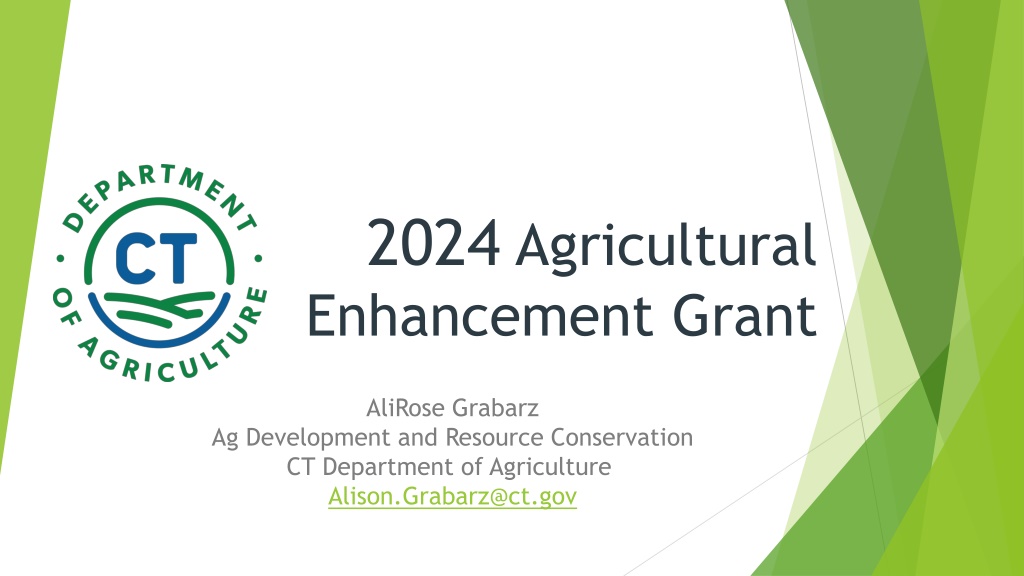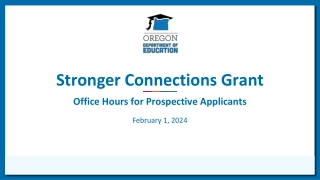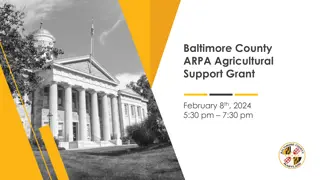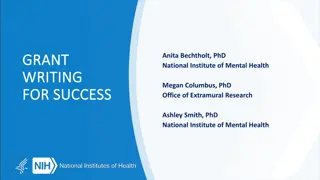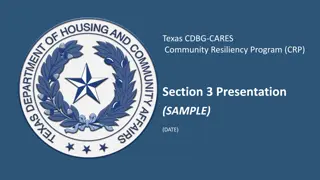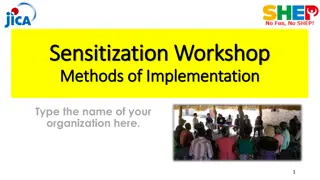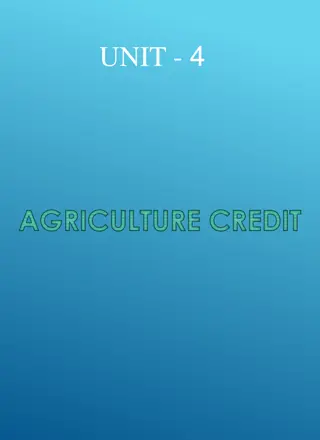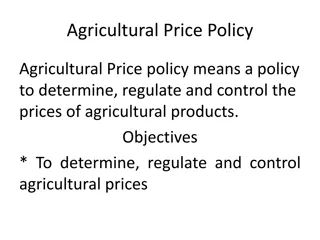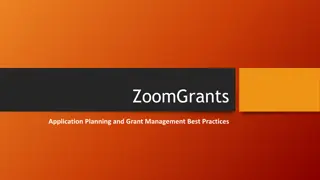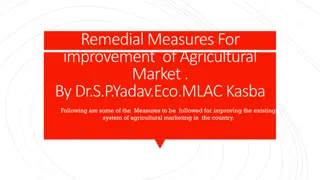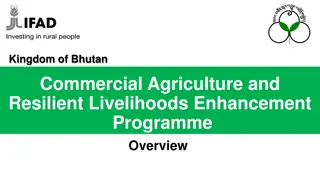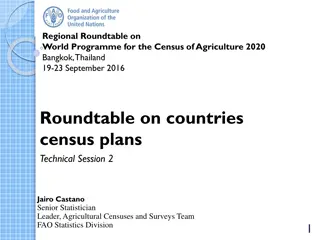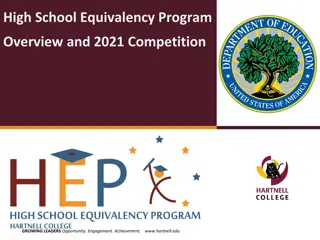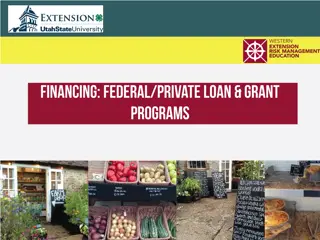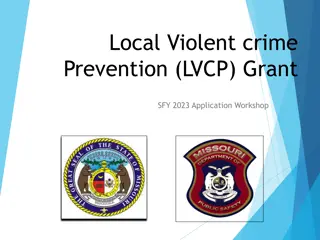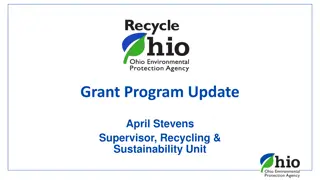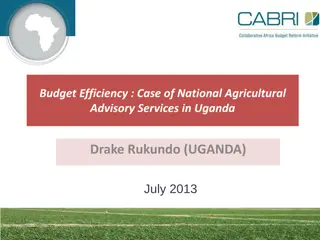Agricultural Enhancement Grant Program Overview
The Agricultural Enhancement Grant Program provides funding for projects that support agricultural viability in Connecticut. Eligible applicants include municipalities, regional councils of governments, and agricultural non-profit organizations. Projects addressing specific focus areas can receive grants up to $49,999 with a 40% match requirement. The program aims to enhance youth agricultural education, foster innovation, and advance sustainable agriculture practices.
Download Presentation

Please find below an Image/Link to download the presentation.
The content on the website is provided AS IS for your information and personal use only. It may not be sold, licensed, or shared on other websites without obtaining consent from the author. Download presentation by click this link. If you encounter any issues during the download, it is possible that the publisher has removed the file from their server.
E N D
Presentation Transcript
2024 Agricultural Enhancement Grant AliRose Grabarz Ag Development and Resource Conservation CT Department of Agriculture Alison.Grabarz@ct.gov
Todays Agenda Welcome Overview of the Grant Program Description Eligible Applicants Microgrants Questions of Focus Match Requirement, Expenses, & Payment Project Duration & Post Award Requirements Submission Process Required attachments Evaluation Criteria and Process Important Dates How to Apply Questions?
Grant Description The Agricultural Enhancement Grant (formerly Farm Viability Grant through December 2023) provides matching funds for projects that directly impact and/or foster agricultural viability. All projects must advance farming and agriculture. The Ag Enhancement Program and any awards are subject to limitations of state funding. Annual program funded by the Community Investment Act
Eligible Applicants 1. Municipalities with a current Plan of Conservation & Development Please visit the CT Office of Policy and Management website to determine if your municipality qualifies. 2. Regional councils of governments organized under the provisions of sections 4-124i to 4-124p, inclusive 3. Groups of municipalities that have established a regional inter-local agreement pursuant to sections 7- 339a to 7-339l, inclusive 4. Agricultural non-profit organizations 1. Must be registered with the CT Secretary of State and provide a copy of their federal IRS exemption letter. 2. Must have submitted Form 990 and been in existence for the previous three years.
Questions of Focus and Microgrants Each Question of Focus and Micro Grant addresses a specific problem, interest, or need of the CT Agricultural Industry. Eligible applicants must describe how their proposed project will address or respond to one Question of Focus or Micro Grant. Applicants may only submit one application. Maximum award for projects addressing a Question of Focus: $49,999 Requires 40% cash or in-kind match Maximum award for projects addressing a Micro Grant: $5,000 Requires 25% cash or in-kind match
1.) Enhancing Youth Agricultural Education Question of Focus: Please propose a project to deliver quality agricultural education, encourage hands-on skill development, or expand the program s available offerings through purchase of specialized agricultural equipment or infrastructure improvements to school, 4-H camp, or fair association facilities. Project Examples: Renovating an existing barn to expand the number or variety of livestock housed and available for educational opportunities. Purchasing cattle chutes to allow students up close and hands-on opportunities to observe and participate in vet or routine health inspections. Micro Grant Opportunity: Vocational Agricultural Centers, municipalities, or nonprofits may apply for up to $5,000 towards hiring agricultural experts to provide guest lectures, supplemental training, or workshops in their area of expertise.
2.) Diversity, Equity, and Inclusion (DEI) in Agriculture Question of Focus: Please propose a project which directly responds to or supports the agency with responding to one of the recommendations identified in the DEI Working Group Report, or another identified area of need by your population of focus. Projects must directly benefit, and be informed by, farmers in one or more of the following classifications: BIPOC, veterans, members of the LGBTQ+ community, or people with a disability. Project Examples: Developing an agriculture education/outreach program to specifically reach BIPOC farmers. Redesigning a community or urban farm to be accessible to individuals with disabilities. Micro Grant Opportunity: Up to $5,000 to make materials or workshops and/or other ag resources more accessible. For example: Hiring a translation service for translation of agriculture-specific or culturally relevant materials, offering an in-person translator or interpreter during a workshop or training, or developing plain language guides.
3. Urban Agriculture Question of Focus: Please propose a project that focuses on establishing or expanding support and resources for urban agriculture. Project Examples: Development of an urban ag master plan. Purchasing irrigation equipment to increase production of an urban community garden. Constructing a washing station at a community garden to allow for packaging and sale of harvested produce at a local farmers market. Micro Grant Opportunity: Up to $5,000 for municipalities that are not eligible for DEEP s Urban Green and Community Gardens Grant program to establish or make improvements to a previously established urban farm or garden. Click here for more on the CT DEEP Urban Green and Community Gardens Grant Program.
4. Food Supply Chain Question of Focus: Please propose a project that would strengthen the local food supply by increasing production of CT Grown farm products, proposing/developing plans for meat processing facilities, or expanding marketing efforts to increase the purchase and sale of CT Grown farm products. Project Examples: Projects that expand food hub operations to increase distribution capacity of CT Grown farm products. Feasibility study for creation of meat processing facility in CT. A food hub purchases a walk-in freezer to double the amount of CT Grown produce they can purchase and distribute. Micro Grant Opportunity: Up to $5,000 to offset expenses for new and beginning, BIPOC, or veteran farmers to participate in a Certified CT Grown farmers market. Expenses such as town permit fees, signage, display necessities (such as tables), food safety related materials (such as portable handwashing station or coolers) would be eligible.
A quick aside: Out Now: Food Systems Capacity Building Grant Due March 6, 2024, at 4:00 p.m. Webinar Overview on February 8thfrom 2-3pm. Grant categories include: Creation or continuance of a local food policy council or food working group to cover costs of development and/or implementation to address food insecurity in Connecticut municipalities. Equipment associated with projects that would create and/or further food access to underserved communities. Local food access to expand buying opportunities in food insecure and low food access communities. Food waste and recovery projects that reduce food loos and waste, recovery efforts, and recycling programs. The maximum amount awarded to any applicant through the Connecticut Food Policy Grant shall not exceed $20,000.00 for an 18-month grant period. There is no match requirement for this grant. Eligibility: Local Food Policy Councils and/or food working groups, Agricultural producers, Food pantries, and Farmers markets, singularly or jointly Contact: Cyrena.Thibodeau@ct.gov for more info!
A quick aside: Coming February 2024: Regional Food System Infrastructure Grant Program Large-scale projects that strengthen the middle of the supply chain by expanding capacity and infrastructure for the aggregation, processing, manufacturing, storing, transportation, wholesaling, or distribution of agricultural products. Eligible Industry: Specialty crops, dairy, grains for human consumption, aquaculture, and other food products. Meat and poultry are ineligible industries/commodities. Awards will be at least $100,000 with a 50% match of the total proposed project cost. Self-identified historically underserved producers and small disadvantaged businesses contribute a 25% match. In-kind and indirect costs eligible for match. Two rounds for this program: 2024: Projects must impact more than one farm business. 2025: Projects are not required to impact more than one farm business. Eligible applicants: Agricultural producers or processors, or groups of agricultural producers and processors; Nonprofit organizations; Local government entities; Tribal governments; and Institutions such as schools, universities, or hospitals. Contact: Cyrena.Thibodeau@ct.gov for more info!
5. Farmland Accessibility Question of Focus: Please propose a project which addresses farmland accessibility or pilots an effort to inventory, survey, and/or prepare vacant farmland for agricultural production. This may be done through infrastructure enhancements as well as promotion of available parcels on the CT Farmlink website. Projects should also improve accessibility for new farmers, current producers looking to expand, or support succession strategies for farmers exiting agriculture. Project Examples: Working with a land trust and other partners to identify potential land for production agriculture. Inventorying land within a municipality(ies) that could be put into production agriculture. Providing support services like lease writing, transition plans, etc. for farmers. Micro Grant Opportunity: Up to $5,000 for municipalities to offer reduced-rate leases of public farmland to new and beginning, BIPOC or veteran farmers.
6. Applicant Identified Question of Focus: Please propose a creative, innovative project to support the viability of local farms and/or the agricultural industry. For applicants looking to pursue a project which does not fit into the previously mentioned Areas of Focus. Micro Grant Opportunity: Please propose a creative, innovative project to support the viability of local farms and/or the agricultural industry.
Other Micro Grants 1. Municipal Farm Map Projects. Maximum award $5,000. o Municipalities may apply for funds to create a multilingual electronic and printed map/brochure highlighting all of farms in their town and host a map unveiling event to encourage community support of local farmers. o Eligible Expenses: Hiring subcontractors to develop the map, materials, provide translation, and limited supplies for the unveiling event, printing the developed materials, and event promotion. 2. Certified Farmers Market Promotion and Outreach. Maximum award $5,000. o Certified CT Grown farmers markets may apply for funds to develop new marketing materials to promote their market and availability of redemption for the Farmers Market Nutrition Program (and Supplemental Nutrition Assistance Program, if applicable) through print, digital, social, or other media outlets while using the CT Grown logo. o Eligible Expenses: Hiring a graphic designer to create media, printing developed materials, distribution of materials, and costs of promoting the market through print, digital, social, or other media outlets.
Match Requirement, Expenses and Payment The maximum award for applications addressing a Question of Focus is $49,999. The maximum award for Micro Grants is $5,000. All grants have a match requirement. Matching funds from the applicant must be a minimum of 40% for Question of Focus grants. Matching funds from the applicant must be a minimum of 25% for Micro Grants. The match can consist of in-kind and/or cash contributions directly related to the project. Employee salaries and fringe benefits to execute the project are allowable expenses, but in total cannot exceed 25% of the grant funds requested. If a grant is providing the match, the applicant must disclose the grantor, the grant name, and amount awarded.
How do I determine my match requirement? Or the grant funds I can apply for? For Question of Focus Grants: 1. Start by finding the total cost for your project. 2. Grant funds will cover 60% of the eligible project costs (up to $49,999). 3. Your total match (cash + in-kind match) must equal at least 40% of the project cost. For Micro Grants: 1. Start by finding the total cost for your project. 2. Grant funds will cover 75% of the eligible project costs (up to $5,000). 3. Your total match (cash + in-kind match) must equal at least 25% of the project cost.
Match Requirement Table for Question of Focus Grants Project Total Cost $1,000 $5,000 $10,000 $15,000 $20,000 $30,000 $40,000 $50,000 $75,000 $83,331.67 $100,000 $150,000 Grant Funds Eligible $600 $3,000 $6,000 $9,000 $12,000 $18,000 $24,000 $30,000 $45,000 $49,999 $49,999 $49,999 Cash Match Required $400 $2,000 $4,000 $6,000 $8,000 $12,000 $16,000 $20,000 $30,000 $33,332.67 $50,001 $100,001 Maximum grant award reached.
Match Requirement Table for Micro Grants Project Total Cost $1,000 $2,000 $3,000 $4,000 $5,000 $6,000 $6,666.67 $7,000 $10,000 Grant Funds Eligible $750 $1,500 $2,250 $3,000 $3,750 $4,500 $5,000 $5,000 $5,000 Cash Match Required $250 $500 $750 $1,000 $1,250 $1,500 $1,666.67 $2,000 $5,000 Maximum grant award reached.
Match Requirement, Expenses and Payment (continued) Expenses that CAN be reimbursed with grant funds: Multi-media marketing expenses Employee salaries and fringe benefits paid to execute the project (cannot exceed 25% of grant funds requested) General purpose equipment and equipment rental if it directly supports the project Consultant or contractor expenses directly related to the project Stipends, honorariums Rental fees
Match Requirement, Expenses and Payment (continued) Expenses that CANNOT be used as a match and will not be funded by the grant Any expense incurred prior to contract execution Land acquisition/mortgages Cost of borrowing (points and other fees) Expenses related to establishing a new organization/business Any portion of expense for which the applicant pays a contractor in merchandise or service in lieu of cash Tuition/tuition reimbursement or career-related/scholarship funds Routine business expenses (utilities, office supplies, etc.) Disposable supplies (office, farm, otherwise) unrelated to the project Legal expenses related to litigation Indirect or contingency costs of any percentage
Match Requirement, Expenses and Payment (continued) Expenses that are an acceptable match if they directly and meaningfully support the proposed project. State/local/federal permits Attorney s fees (not related to litigation) Consumable or disposable supplies Employee salaries and fringe benefits paid to execute the project
Project Duration & Post Award Requirements Applicants of awarded projects will be responsible for the following: Signing an agreement with the State of Connecticut Providing a Certificate of Insurance listing the state as an additional insured on the grantee s liability insurance policy Completing the project within the 18-24-month contractual timeframe Submitting a final project report in the required format per the executed contract. Submitting a final financial report itemizing actual expenses. Copies of invoices and proof of payment must be submitted with the payment request at the conclusion of the project Agreeing to a site inspection once the project is complete and prior to final payment being released Other requirements as outlined in the State of Connecticut contract.
Project Duration & Post Award Requirements (continued) These are reimbursement grants. Incomplete projects cannot be fully reimbursed. After the agency issues a purchase order, one cash advance of up to 50% of the total grant award may be requested by the grantee. The balance of the award will be reimbursed upon project completion and submission of required reporting documents.
Submission Process All Agricultural Enhancement Grant applications are required to be submitted through Cognito by February 16that 4:00pm The form locks at 4:00:00. Submit well before then. The application link is available on the Ag Enhancement website. Agricultural Enhancement Grant (formerly Farm Viability)--Apply (ct.gov) 2024 Agricultural Enhancement Grant Application (cognitoforms.com)
Application Requirements A complete application includes: Budget Form Grant Narrative Questions Attachment of any quotes/estimates, conceptual drawings, and other budget justification items. If the project will be taking place on land that is leased or rented, a landlord consent form will also be required. All forms and templates are available here: Agricultural Enhancement Grant (formerly Farm Viability)--Documents (ct.gov)
Uploading Attachments to your Application Attachments must be in MS Word/Excel or PDF format. File formats including Pages or Numbers cannot be viewed and will not be accepted.
Budget Forms Go to: Agricultural Enhancement Grant (formerly Farm Viability)--Documents (ct.gov) Look under Documents/Forms on the left. Save a copy to your computer and attach to your application.
Budget Form Your budget must contain the following itemized categories.
Budget Narrative Provides the justification for expenses that are not accompanied by a quote/screenshot. Can include: links to products you plan to order online, the breakdown of anticipated salary or volunteer costs, and a more detailed list of materials planned on being purchased.
What is an in-kind match? In-kind donations= donations or services provided in place of a cash match. An in-kind match is the value of any real property, equipment, goods, or services that would have been eligible costs if the recipient was required to pay for such costs. If you have volunteers assist on the completion of your grant project, their time and effort has a monetary value even though you do not pay them for their services. The current value of a volunteer in CT is $34.56 per hour. Some volunteers may have different values for their time. In-kind expenses can contribute to the match component but grant funds cannot cover them.
Grant Narrative Go to: Agricultural Enhancement Grant (formerly Farm Viability)-- Documents (ct.gov) Look under Documents and Forms Save a copy to your computer and respond to the questions.
Grant Narrative The WHO, WHERE, HOW, WHY, and WHEN of your project. Be thorough in your explanation of the project but keep it clear and succinct. Be sure to answer all of the questions!
Landlord Consent Form Required if the project will be taking place on land that is rented or leased.
Evaluation Criteria and Process The Agricultural Enhancement Grant is a competitive grant. Only complete applications submitted on time will be evaluated. The grant evaluation will be weighted heavily on the project plan described in the Grant Narrative. Quotes, estimates, letters of support, conceptual drawings, and other documentation justifying and supporting the budget and project are required to present a competitive application.
Important Dates Application Period: Friday, January 5 Friday, February 16, 2024, at 4:00 p.m. Application Deadline: Friday, February 16, 2024, at 4:00 p.m. Project Start Date: May 2024
Quick Recap Grant Deadline: Friday, February 16, 2024, at 4:00pm Applicants choose ONE Question of Focus or Micro Grant to apply for. Applicants should attach the budget form, grant narrative, landlord consent (if applicable) and quotes/estimates/budget justification items to their application Apply at: 2024 Agricultural Enhancement Grant Application (cognitoforms.com) Grant Information: Agricultural Enhancement Grant (ct.gov)
Questions? Contact Information AliRose Grabarz Ag Development and Resource Conservation CT Department of Agriculture (860) 993 - 5275 Alison.Grabarz@ct.gov
